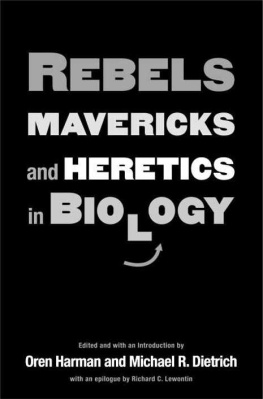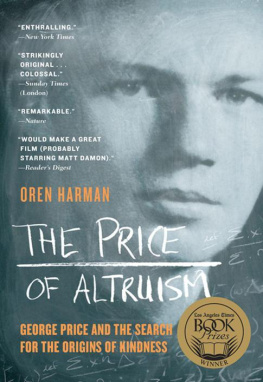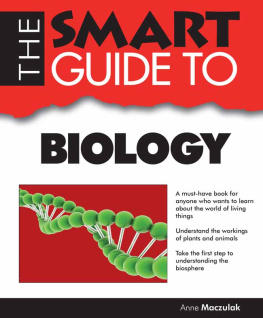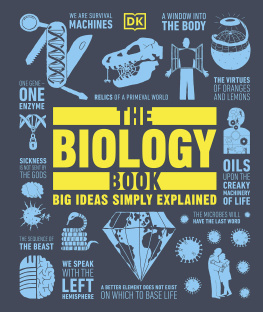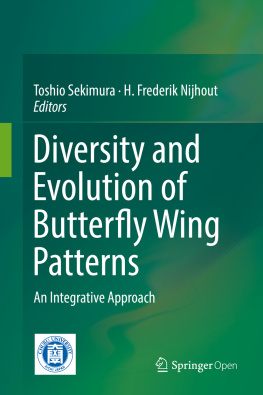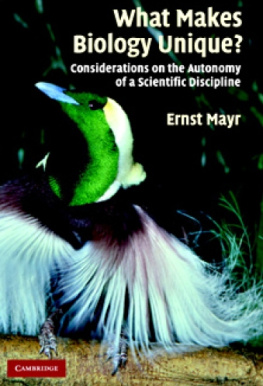REBELS, MAVERICKS, AND HERETICS IN BIOLOGY
Edited and with an Introduction by
OREN HARMAN and MICHAEL R. DIETRICH
and with an Epilogue by R. C. Lewontin
copyright


To Savtale, who lost a debate all those years ago, and won our everlasting love
O. H.
To Lydia and Arlena, who don't take anything too seriously
M. R. D.
Contents
Preface ix
Acknowledgments x
1 Introduction: On Rebels, Icons, and the Value of Dissent 1
OREN HARMAN AND MICHAEL R. DIETRICH
2 Alfred Russel Wallace, the Discovery of Natural Selection, and the Origins of Humankind 20
MICHAEL RUSE
3 Rebel With Two Causes: Hans Driesch 37
GARLAND E. ALLEN
4 Wilhelm Johannsen: A Rebel or a Diehard? 65
RAPHAEL FALK
5 Raymond Arthur Dart: The Man Who Unwillingly Ushered in a Revolution in the Evolution of Humankind 84
PHILLIP V. TOBIAS
6 In Weismann's Footsteps: The Cyto-Rebellion of C. D. Darlington 103
OREN HARMAN
7 Striking the Hornet's Nest: Richard Goldschmidt's Rejection of the Particulate Gene 119
MICHAEL R. DIETRICH
8 Rebellion and Iconoclasm in the Life and Science of Barbara McClintock 137
NATHANIEL COMFORT
9 Challenging the Protein Dogma of the Gene: Oswald T. Avery, a Revolutionary Conservative 154
UTE DEICHMANN
10 Roger Sperry and Integrative Action in the Nervous System 174
TIM HORDER
11 Leon Croizat: A Radical Biogeographer 194
DAVID L. HULL
12 Dogma, Heresy, and Conversion: Vero Copner Wynne-Edwards's Crusade and the Levels-of-Selection Debate 213
MARK BORRELLO
13 Peter Mitchell: Changing the Face of Bioenergetics 231
JOHN PREBBLE AND BRUCE WEBER
14 Howard Temin: Rebel of Evidence and Reason 248
DANIELJ. KEVLES
15 Motoo Kimura and the Rise of Neutralism 265
JAMES F. CROW
16 Against the Grain: The Science and Life of William D. Hamilton 282
ULLICA SEGERSTRALE
17 The Iconoclastic Research Program of Carl Woese 302
JAN SAPP
18 Stephen Jay Gould, Darwinian Iconoclast? 321
DAVID SEPKOSKI
19 Culture and Gender Do Not Dissolve into How Scientists "Read" Nature: Thelma Rowell's Heterodoxy 338
VINCIANE DESPRET
20 Bringing Statistical Methods to Community and Evolutionary Ecology: Daniel S. Simberloff 356
WILLIAM DRITSCHILO
Epilogue Legitimation Is the Name of the Game 372
R. C. LEWONTIN
List of Contributors 381
Index 385
Preface
This volume emerged from our mutual interest in iconoclastic biologists. Having devoted our earlier scholarly efforts to elucidating the work of Cyril Darlington (by Oren Harman) and Richard Goldschmidt (by Michael R. Dietrich), we sought to broaden our view beyond these two rebellious biologists. Finding iconoclasts in biology was not as difficult as finding authors who would engage deeply with their rebellion. Although the scientists presented in these pages represent only a selection, the contributors have put their histories to great use and raised important questions about the nature of orthodoxy and dissent, the impact of institutions on innovation, and the power of personality in science.
It is our hope that Rebels, Mavericks, and Heretics in Biology will prove to be of interest to historians and philosophers of science, as well as working biologists and scientists. We are also hopeful that a volume dedicated to an analysis of the role of dissent and iconoclasm in science might appeal to a broader audience that finds itself interested in the growth of biology in modern times, in the dynamics of scientific knowledge, or both. There are also great advantages, we feel, to teaching the development of scientific thought through a rigorous examination of the researchers and thinkers who departed from the norm. Such a consideration highlights the need to constantly scrutinize the working assumptions on which "normal" science is based and emphasizes the important role of thinking "outside the box." We feel that at a time in which the biological sciences seem to be moving in new and exciting directions and continually inventing new subdisciplines and languages, these essays will be of considerable interest.
Acknowledgments
We thank the contributors to this book, who bravely withstood the kind of editorial nagging only a rebel (or an unperturbed professional) would swat away. Michael, Gar, Rafi, Phillip, Nathaniel, Dan, Jan, Vinciane, Ute, Bill, David H., David S., Mark, John, Bruce, Jim, Tim, and Ullica: your dedication and fine scholarship helped turn a hunch about the idiosyncrasy of rebellion and the value of its study into a well-supported and broad piece of historical evidence. Thanks, too, to Richard Lewontin, who agreed to write the epilogue to this book, and as usual, enlightened us all.
To Jean Thomson Black, the kindest, most efficient, and most professional of editors, who guided our travels with wisdom and good humor, thanks for your unfailing encouragement and support. And thank you, too, Jane Zanichkowsky, for working with much talent to make this book an infinitely smoother read than it was before coming under your exacting pen.
Last but not least, to all the rebellious minds lurking out there behind the page: Audentes fortune iuvat. We eagerly await your awakening!
REBELS, MAVERICKS, AND HERETICS IN BIOLOGY
CHAPTER ONE
Introduction:
On Rebels, Icons, and the Value of Dissent
OREN HARMAN and MICHAEL R. DIETRICH
The history of science is invariably told through the lives of its heroes, and modern biology is no exception. Men and women who, with painstaking research and brilliance, have helped advance science to the heights we call "today" have been our guides. Historians have studied their lives in order to analyze the growth of the life sciences, the rise of institutions and disciplines, and the evolution of biologists' understanding of nature. Insofar as we seek narratives concerning humankind's quest for knowledge, it is not surprising that some biologists should be cast as heroes. But it is not the whole story.
Seldom is the story of biology told through the tale of its rebels: men and women who challenged the prevailing picture of life in the myriad disciplines that, taken together, constitute modern biology. Some of these researchers were in fact wrong; others, though lambasted for their views at the time, will be found-or have already been found-to deserve a more appreciative treatment. Some have been called cranks, others gadflies, still others prophetic. Not all have been heroes. But whether vindicated by history or forgotten, scientific rebels, as is true for challengers of any kind, may teach the challenged much about themselves and about the issues that most feel are no longer in need of scrutiny. Even when such challenges end up being resisted, the Italian economist Vilfredo Pareto's comment on the importance of dissent is worth remembering: "Give me a fruitful error any time, full of seeds, bursting with its own corrections. You can keep your sterile truth to yourself."1
In Rebels, Mavericks, and Heretics in Biology, we have collected the stories of leading iconoclastic figures in biology throughout the late nineteenth and twentieth centuries. The chapters that follow do not offer full biographical treatments of their subjects but, rather, focus on particular challenges to particular orthodox assumptions in the life sciences. It is our hope that the collection of these different narratives will provide a fuller understanding of the role of dissent and controversy in science.

